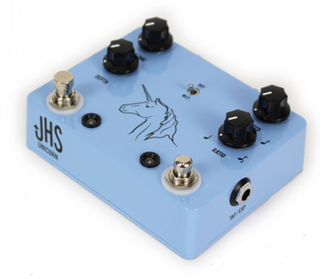Review: JHS Pedals Unicorn Uni-Vibe Pedal

GOLD AWARD
The original Uni-Vibe pedal developed during the late Sixties was a primitive, early attempt at creating a phase shifter, and for decades nothing else sounded like it.
Then along came various reproductions and clones, which offered similar thick, chewy swirling sounds with varying degrees of success.
Today, finding a good Uni-Vibe pedal isn’t as much of a challenge as it was two decades ago, but rare is the beast that offers guitarists something a little bit different in terms of features and functionality.
With its all-analog circuitry and tap tempo function, the JHS Unicorn is one such device, providing genuine classic Uni-Vibe sounds as well as modern upgrades that inspire new, creative ways to use this timeless effect.
FEATURES
Housed in an enclosure that’s about the same size as an MXR Flanger, the JHS Unicorn is larger than some recent Uni-Vibe-style pedals, but it’s still compact enough to comfortably fit on most pedal boards. Uni-Vibe enthusiasts know that photocell modulation is the key to authentic Uni-Vibe effects, and the Unicorn does not disappoint, using an all-analog signal path and photocell topology to provide authentic vibe tone.
Like the original, the Unicorn provides volume, depth (intensity), and speed controls (adjustable via a front panel knob or with an optional expression pedal), as well as a switch for selecting dry (chorus) or wet (vibrato) settings. New features include the aforementioned tap tempo footswitch (a separate footswitch connected to the tap/exp jack can also be used to control tap tempo) and a ratio control for selecting 1/4-, dotted 1/8–, 1/8-, or triplet-note speed ratios. A white bypass LED let users know if the effect is engaged, while the white tap tempo LED pulsates in time with the selected speed. The pedal operates with a standard 9VDC negative power supply.
PERFORMANCE
The unicorn may be a mythical beast, but the Unicorn pedal’s Uni-Vibe tones are as real as it gets. The classic dry (chorus) setting remains thick whether it’s placed in front of a clean or distorted amp, and the effect has an expressive, voice-like character. The wet setting is more subtle but still useful for players who love lush textures.
Being able to time the sweep to a song’s tempo using the tap tempo function and ratio control is very cool, and most guitarists will likely find that these features alone significantly increase the usefulness and creative potential of a vibe effect.
STREET PRICE $299
MANUFACTURER JHS Pedals, jhspedals.com
•A tap tempo footswitch and ratio control with four settings allows guitarists to perfectly time the effect’s sweep to a song’s tempo in several creative ways.
•With its volume, speed, and depth controls and wet/dry settings, the Unicorn offers all of the same functionality as the classic Uni-Vibe effect.
THE BOTTOM LINE If you are looking for authentic, classic Uni-Vibe effects but also prefer modern performance upgrades, the JHS Unicorn is a great choice for purists and innovators alike.

Thank you for reading 5 articles this month**
Join now for unlimited access
US pricing $3.99 per month or $39.00 per year
UK pricing £2.99 per month or £29.00 per year
Europe pricing €3.49 per month or €34.00 per year
*Read 5 free articles per month without a subscription
Get The Pick Newsletter
All the latest guitar news, interviews, lessons, reviews, deals and more, direct to your inbox!
Chris is the co-author of Eruption - Conversations with Eddie Van Halen. He is a 40-year music industry veteran who started at Boardwalk Entertainment (Joan Jett, Night Ranger) and Roland US before becoming a guitar journalist in 1991. He has interviewed more than 600 artists, written more than 1,400 product reviews and contributed to Jeff Beck’s Beck 01: Hot Rods and Rock & Roll and Eric Clapton’s Six String Stories.

"With a unit this affordable, are the effects any good? Yes! They really are": Zoom MS-50G+ Multistomp review

“One of our best-selling pedals for over a decade with an updated feature set”: Electro-Harmonix responds to sky-rocketing looper competition with the Pico 360+ – can this mini looper take the crown?